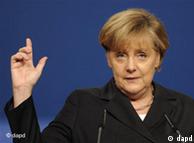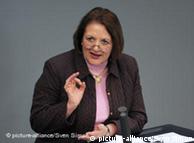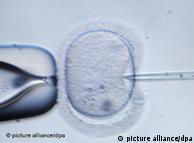Christian Democrats vote in favor of embryo screening ban
A tight majority of 51 percent of the delegates voted to retain existing policy on pre-implantation genetic diagnosis (PGD). Policy from 2007 allows in vitro fertilization but makes it illegal to check the cells for hereditary diseases. Chancellor Merkel had been pushing the ban in the run-up to the convention in Karlsruhe.
 Chancellor Merkel was among those who favor a ban
Chancellor Merkel was among those who favor a ban
“I favor a PGD ban because I am concerned that we cannot define its limits properly,” Merkel said on Monday.
The issue is of key importance to the party as the CDU has, by definition, to uphold Christian values. According to mainstream Christian teaching, life begins at conception.
Deep divisions
The party is however deeply divided over the issue, and the conference experienced an emotional debate lasting more than three hours. For many, the memory of the Nazis administering lethal injections to handicapped children forbids embryo screening in modern Germany.
“If life is a gift from God, it is not given with any condition,” Julia Kloeckner, leader of CDU in the state of Rhineland Palatinate said. “It would be disturbing for doctors to decide which embryos should be allowed to live by saying ‘you’re okay, you’re not,'” she added.
A lesser evil compared to still births and abortions
But to delegates in favor of restricted PGD use, pre-screening would be the lesser evil compared to still births and abortions. “There is a difference between an embryo before and after [implantation in the womb] has taken place,” said Minister for Family Affairs Kristina Schroeder.
Other CDU delegates agree. According to Peter Hintze, deputy economics minister, it does not make sense that numerous examinations of the fetus inside the womb are allowed, but examinations of the embryo in a petri dish are not.
“PGD would not mean the creation of a designer baby,” Hintze, a protestant theologian, said. “Whoever believes the desire for a blue-eyed baby would lead anyone to undergo IVF, does not meet reality at all.”
Jens Spahn, CDU’s expert on health matters, did not believe that pre-screening techniques will be limited to serious diseases only.
Legislation expected
In July, the Federal Court of Justice ruled that PGD is currently exempt from punishment. In the coming weeks, the German parliament, the Bundestag, will decide whether PGD should be banned by law. Tuesday’s decision might dissuade some CDU delegates from voting against the ban.
 Justice Minister Leutheusser-Schnarrenberger demanded a debate on PGD
Justice Minister Leutheusser-Schnarrenberger demanded a debate on PGD
Justice Minister Sabine Leutheusser-Schnarrenberger, a member of the CDU’s coalition partner the FDP, criticized the decision and said a debate was needed in order to define strict guidelines for the use of PGD. Many of her party colleagues demand a limited usage of the technique. Other European nations such as Britain, France, Belgium and Denmark already permit the screening.
Integration policy
The CDU also decided on stricter rules for foreigners who are not willing to integrate. Chancellor Merkel recently declared multiculturalism to have failed and the conference agreed to pursue an integration policy that was in the “interests of Germany” and an end to the “politics of misunderstood tolerance.”
“Those rules are actually quite simple. Whoever wants to live here has to learn German. Whoever lives here has to respect our laws and values,” Merkel said. “Those who do not follow the rules can expect to face sanctions.”
Author: Bernd Gräßler / Sarah Steffen (dpa, epd, AP)
Editor: Rob Turner
